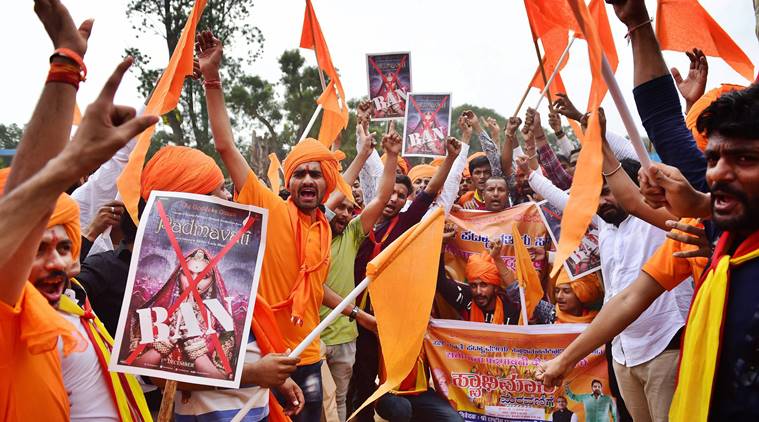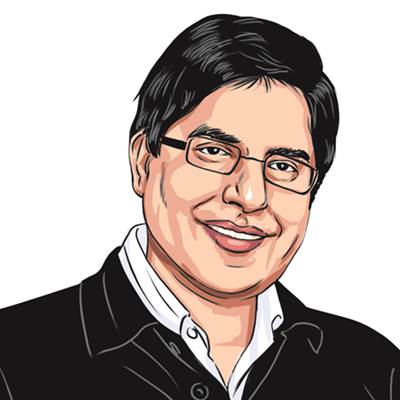Opinion An imperilled right to offend
The forced retreat of M.F. Husain, attack on ‘Padmavati’ — it is naive to believe that only fringe groups are to blame
 Bengaluru : Members of Rashtriya Rajput Karni Sena shout slogans against fimmaker Sanjay Leela Bhansali during a protest demanding for a total ban on the movie "Padmavati' at Freedom Park in Bengaluru on Wednesday. (Source: PTI)
Bengaluru : Members of Rashtriya Rajput Karni Sena shout slogans against fimmaker Sanjay Leela Bhansali during a protest demanding for a total ban on the movie "Padmavati' at Freedom Park in Bengaluru on Wednesday. (Source: PTI)  Members of Rashtriya Rajput Karni Sena shout slogans against fimmaker Sanjay Leela Bhansali during a protest demanding for a total ban on the movie ‘Padmavati’ in Bengaluru. (PTI)
Members of Rashtriya Rajput Karni Sena shout slogans against fimmaker Sanjay Leela Bhansali during a protest demanding for a total ban on the movie ‘Padmavati’ in Bengaluru. (PTI)
Freedom of speech and expression in India is increasingly in the grip of non-state actors, imposing their law as self-appointed artistic police. State authorities, acting under the diktats of elected representatives, are driven by political considerations rather than legal precept. The court machinery, instead of serving as a bulwark against the infringement of this constitutionally cherished right, is often activated to serve the cause of harassment of the artist, writer or filmmaker. Eventually, the hallowed legal principles protecting free speech are successfully invoked before the superior courts of law, but the process is so punishing for the artist that this belated success remains a pyrrhic victory. The creative pen or brush is forever saddled with the inhibition of self-censorship. The suffering inflicted acts as a cautionary tale for others to avoid controversy and play it safe. And so the freedom of expression is held hostage by dogma.
The growing controversy surrounding Sanjay Leela Bhansali’s Padmavati and last year’s attack on Ae Dil Hai Mushkil that starred a Pakistani actor, Fawad Khan, in the wake of deteriorating relations with Pakistan, are cases in point. The late M.F. Husain was hounded out of India by constant harassment from purported community groups with clear political affiliations. A slew of criminal cases were filed against him across the country, objecting to his “Bharat Mata” painting. Even though Justice Sanjay Kishan Kaul of the Delhi High Court (now a judge of the Supreme Court), in a poignant judgment in 2008, quashed the complaints, thoughtfully observing, “A debate should never be shut out. ‘I am right’ does not necessarily imply ‘You are wrong’. A painter at 90 deserves to be in his home — painting his canvas.” The prospect of further attacks was too much to take for a man in the dusk of his life. And so he retreated, spending his last years out of India.
 Having represented Husain before the Delhi High Court, I recall him recounting an incident where a stranger on a railway platform looked at him with what Husain perceived to be utter hatred. He told me he did not want to spend his last years surrounded by such hostility. Though he publicly apologised for any offence he may have unintentionally caused by his paintings, he felt his work was an expression of his immense love and regard for the composite culture of India, requiring no apology. He was deeply frustrated by the prospect of having to face legal cases, and found the thought of a policeman knocking on his door inquiring about his paintings both farcical and frightening. In his last years, he yearned to return to India. Ironically, he thought the protests against his art would only stop once the BJP came to power at the Centre because he believed “they are communal when they want to gain power, and will want to show they are secular once they are in government”.
Having represented Husain before the Delhi High Court, I recall him recounting an incident where a stranger on a railway platform looked at him with what Husain perceived to be utter hatred. He told me he did not want to spend his last years surrounded by such hostility. Though he publicly apologised for any offence he may have unintentionally caused by his paintings, he felt his work was an expression of his immense love and regard for the composite culture of India, requiring no apology. He was deeply frustrated by the prospect of having to face legal cases, and found the thought of a policeman knocking on his door inquiring about his paintings both farcical and frightening. In his last years, he yearned to return to India. Ironically, he thought the protests against his art would only stop once the BJP came to power at the Centre because he believed “they are communal when they want to gain power, and will want to show they are secular once they are in government”.
The legal contours of the right to free speech allow for causing offence. A person who sustains offence, is equally free to express her sense of injury, by peaceful protest and social censure. In Husain’s case, the Court recognised that artistic expression does not axiomatically fall foul of the law, merely because it offends. It said: “Every time an artist portrays something different, something which is an unpopular viewpoint, it may accompany discomfort and unpleasantness but that in itself cannot be a ground to curb the artistic freedom and quickly go on to label it as obscene. There might be people who may actually get offended by Husain’s paintings or others, but the right course of action for them is to simply shrug it off or protest peacefully.”
By being a silent spectator, and waiting for the courts’ intervention, the State is complicit in fostering an environment where these self-appointed groups use extra-legal means to restrict free speech. The State has a legal obligation to ensure that this fundamental right is insulated from attack. The State routinely appears debilitated by threats of public disorder by protesting groups. In an attempt to diffuse the situation, governmental authorities often aid and abet the detractors in compelling the author/artist to apologise and compromise. Such actions have a further chilling effect on free speech. Lately, Vasundhara Raje wrote to the information and broadcasting ministry, suggesting that a committee of historians, film experts and members of the Rajput community be formed to consider necessary changes to Padmavati to avoid hurting sentiments. Last year, in a bid to avert the threat to Ae Dil Hai Mushkil, Karan Johar initially released a video statement asserting his love for his country and promising not to engage with Pakistani artistes in future, and thereafter, in a meeting with Raj Thackeray of the Maharashtra Navnirman Sena (MNS), brokered by Chief Minister Devendra Fadnavis, Johar agreed to donate Rs 5 crore to the Army Welfare Fund to assuage sentiments.
It is comforting but naive to believe this interference with free speech emanates only from fringe groups and does not represent the views of a more tolerant public. The ability of such vocal groups to intimidate and harass artists and immobilise the State into a confirming party, suggests the tacit support of a larger section of the public. Freedom of speech, based on individualism, is well-established as a constitutional ideal. But it is less rooted in Indian communitarian culture which places greater value on social identity shaped by community relationships. Individuals are often punished, by extra-legal means, for acting against community mores. Children are often discouraged from questioning or speaking up. Individual choice is made to yield to familial and community expectation. Patriarchy and hierarchy suppress individual expression. Unless individual freedom becomes embedded as a cultural value, freedom of speech will always be under attack.





